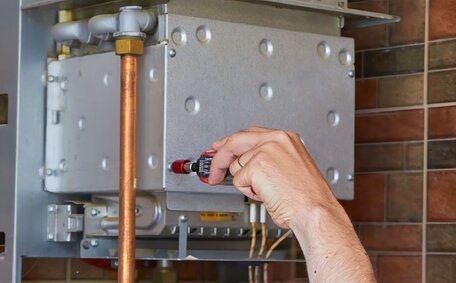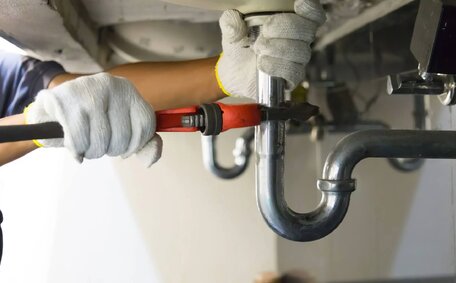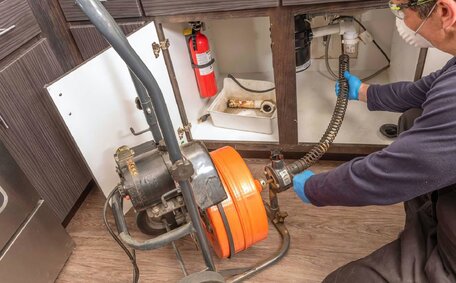Introduction to Water Heater Troubleshooting
When the supply of hot water to your house begins to falter, it can cause major disruptions to your daily routine. A properly functioning tankless water heater is essential for tasks like showering, washing dishes, and doing laundry. Unfortunately, water heaters can develop issues over time that impede their ability to heat water.
At Dulwich Hill Plumbing, we are proficient in diagnosing and repairing a multitude of hot water heater issues. Our licensed technicians are adept at resolving all manner of hot water issues, including faulty thermostats and blown fuses.
In this guide, we’ll address the common issues that lead to a lack of hot water and provide actionable troubleshooting tips you can attempt before calling a professional.
In the sections below, you’ll discover how to test thermostats and heating elements, reset breakers, and tweak water pressure and temperature settings.
We’ll also discuss when you should call your licensed plumber to prevent safety issues or further appliance damage. While some basic troubleshooting steps may get your hot water working again, complex repairs often necessitate an expert’s skills.
Join us as we simplify the complexities of troubleshooting your hot water system. With some helpful DIY tips and knowledge of when to call the pros, you’ll be well equipped to address any hot water issues in your Dulwich Hill home.
Common Water Heater Problems
There are several common issues that can cause problems with your hot water system and interrupt you from getting any hot water:
If you have no hot water at all coming from your taps, it might be an issue with your gas hot water system or one of these potential causes:
- A faulty thermostat that isn’t working and signalling the heating elements to turn on
- A blown fuse or tripped circuit breakers for the water heater
- A malfunctioning upper heating element or a compromised lower heating element
- A pilot light that has gone out (on gas water heaters)
- An issue with the gas supply or gas control valve (on gas heaters)
If your hot water unit is producing some warm water but not meeting your household needs, the issue may be:
- Thermostat set too low
- Sediment buildup on heating elements
- Restricted water flow due to partially clogged water pipes causing low water pressure
- Improperly sized water heater
Overly Hot Water
Water that is too hot can pose a scalding hazard. Potential causes include:
- A faulty thermostat
- The temperature setting is excessively high
- A bad mixing valve
We’ll explore each of these common water heater problems and troubleshooting steps in more detail in the following sections.
No Hot Water
One of the most vexing issues with a common hot water heater is when there no hot water comes out after you activate the hot tap. There are several possible reasons why your water heater has stopped heating the water.
Power or Gas Supply
First, make sure the power water supply or gas supply to your water heater is functioning correctly to ensure hot water is delivered to your home. Ensure your electric hot water system is functional by checking that your house circuit breaker is on and has not tripped. For your gas heater, check gas to see if the pilot light is lit - if not, refer to your manual for relighting instructions.
Heating Element or Thermostat
Utilising a multimeter, you can check continuity through the probe terminal points to indicate if elements are working. A lack of continuity indicates that the element needs replacement.
Electric water heaters have an upper element heating system, as well as a lower heating element, which should both show continuity between terminals. If the power water/gas supply checks out, the next step is testing the internal components.
Test the upper thermostat by increasing the temperature setting to certify that the water heater is adequately warming your home. A faulty thermostat necessitates a professional replacement to ensure your water heater functions correctly.
When to Call a Professional
Diagnose and possibly fix your hot water issues using the steps above, but leave extensive repairs such as replacing elements, thermostats, or control valves to qualified technicians.
Not Enough Hot Water
A common source of frustration is when your hot water runs out too soon or isn’t hot enough. There are a few possible reasons why your water heater fails to meet your household’s hot water demands:
Faulty Thermostat
If the thermostat is broken, it may not be signalling the heating elements to turn on and properly heat the water. Try adjusting the temperature setting higher to see if more hot water starts flowing. If the thermostat is defective, a technician will need to replace it.
Sediment Buildup
Over years of operation, hard water can result in sediment collection on the base of the water heater tank and the heating elements. This buildup insulates the water from getting hot. Flush out the tank according to manufacturer guidelines to address lack hot water and restore heating efficiency.
Small Tank Size
An undersized hot water tank may not meet demand if your water usage has increased due to changes in family size or new appliance installations. The usual expectancy for a water heater, before you experience no hot water your home, ranges between 8-12 years. If capacity limitations impact your hot water supply, consider upgrading to more efficient units.
Minor adjustments like increasing the thermostat or draining sediment may resolve an inadequate hot water supply. If not, there may be an underlying repair needed or time for a new system sized for your needs.
Water Too Hot
If your hot water coming out is dangerously hot, it poses a safety risk of potential scalding. To ensure safety, check see that the water heater’s thermostat is programmed not to exceed 48-50 degrees Celsius.
To adjust the water temperature, carefully turn down the temperature dial on the thermostat 10 degrees lower until the hot water reaches a safe level. Monitor the temperature by placing a thermometer under the running water.
If adjusting the thermostat does not resolve the overly hot water issue, it may be a high-temperature limit issue that requires a professional’s intervention for replacement.
Leaking Water Heater
Finding a puddle of water under your hot water system is never a welcome sight. Leaks commonly stem from a handful of components in need of repair or replacement:
Temperature and Pressure Relief Valve
All water heaters have a T&P relief valve that opens to release excess heat and pressure buildup from the storage tank. If any water is dripping from the valve, the pressure settings may require adjustment or the valve replaced if faulty.
Heating Element Gasket
Loose supply wiring around electric heating elements can cause leaks at the gaskets. Carefully tighten the bolts to compress the gasket for a proper seal. If degradation has hardened the gasket, a new one will be required.
Corroded Tank
Over years of operation, accumulated moisture and minerals can corrode holes in the inner tank. Replace old anode rods regularly to help protect the tank lining. However, if the corrosion is too advanced, you will need to replace the entire system.
For any complex repairs involving part replacements or installations, contact our licenced technicians to properly address water heater leaks.
Noisy Water Heater
If your water heater is producing excessive noise like rumbling, popping, or banging sounds, it often signals sediment buildup within the water your tank houses. With sediment hardening around them, the elements may cause more than just loud noises; they are at risk of causing a short circuit as they expand and contract.
To help quiet a noisy water heater, flush the tank per the manufacturers instructions to clear built-up sediment.
While draining the tank, you can also inspect the anode rod. This rod protects the tank lining from corrosion but gets consumed in the process. Replacing a worn-down anode rod reduces noise and extends the water heaters lifespan.
If flushing the tank and replacing the anode rod dont resolve the noise issues, the water heater may have internal damage requiring professional service or replacement. Our technicians can inspect noisy systems to determine if repairs or a new unit are needed.
Smelly or Discolored Water
Unpleasant odours or discoloured water from your hot water taps can point to issues with your hot water heater, possibly due to bacterial growth or rust buildup. Bacteria can form in areas with sediment accumulation and produce a "rotten egg" smell. Rusty brown, yellow, or red tinted water points to corrosion occurring on internal components.
Sanitise the Tank
To kill bacteria and associated smells, flush the tank and then fill it with water mixed with 2 cups of bleach. Run hot water through all faucets to circulate the sanitising solution before draining and refilling the tank. This should eliminate bacterial odours.
Check Anode Rod and Tank
If flushing the tank doesn’t resolve smelly or discoloured water, inspect the anode rod. Also have a technician check the tank lining and assess if internal corrosion is beyond DIY repair.
Diagnosing and Fixing Electric Water Heater Issues
Electric models are a type of water heater that powers your home with efficient heating solutions. Key parts to check include the heating elements, thermostats, and high-temperature limit switch.
Testing the Heating Elements
Conduct separate tests on each element with a multimeter.
The most common reading you should measure is about 13 ohms resistance between the two terminals on each element.
Replacing Thermostats
If adjusting the temperature setting to heat up your electric water heater higher doesn’t restore hot water, the thermostat may be defective. Before testing for thermostat continuity with a multimeter, you’ll need to cut off power and the water supply to the system. If faulty, a professional will need to install a new thermostat.
Resetting High Temperature Cutoff
Should the high-temperature limit switch trip, power off and let the water cool below 60°C, then press the reset button to re-engage the heater.
To learn more about troubleshooting tips or assistance with replacing any components, don’t hesitate to contact our knowledgeable technicians at Dulwich Hill Plumbing.
Diagnosing and Fixing Gas Water Heater Issues
Gas water heaters rely on a continuously burning pilot light to ignite the burner when hot water is needed. Diagnosing common gas hot water heater issues involves checking the pilot light, gas controls, and confirming adequate gas supply.
Checking the Pilot Light
If you have no hot water, check that the pilot light is lit.
Locate the pilot flame via the viewing window and contact gas professionals if the issue persists.
Inspecting Gas Controls
Verify gas is flowing to the water heater by testing the gas supply line and control valves. Watch for corrosion that could block gas flow. If controls or the gas line are damaged, replacement by a qualified technician is required.
In contrast to gas water heaters that use a pilot flame, electric models feature two separate heating elements. This distinct process means unique troubleshooting focused on the gas supply system.
DIY Water Heater Repairs
There are a few basic repairs on a hot water system that a homeowner can safely attempt themselves with proper precautions. However, more complex issues are best left to a professional service technician.
In some cases, you can replace a thermostat by purchasing a new unit, turning off the heater’s power, and following simple installation steps.
Replacing Heating Elements
Electric water heaters contain an element heating system including an upper and lower heating element that heat the water. If continuity testing reveals a faulty element, they can be replaced by an owner who is comfortable working with electrical connections. As always, exercise caution and turn off power first.
Replacing Anode Rods
The "sacrificial" anode rod protects the tank lining from corrosion but wears out over time. Periodically replacing this rod extends the tank’s lifespan. Use caution working inside the tank and drain all water first.
For extensive repairs like leaks, unusual noises or complex electrical issues, contact our professional technicians at Dulwich Hill Plumbing for reliable service.
When to Call a Professional Plumber
While basic troubleshooting and minor repairs can often be tackled as DIY projects, there are certain water heater issues that require professional assistance. If you experience complex electrical problems, substantial leaks, strange noises, or are unable to relight the pilot on a gas heater, it’s best to call a licenced plumber for service.
Extensive repairs like replacing thermostats, heating elements, anode rods or gas valves should only be handled by qualified technicians. Incorrect repairs can lead to safety hazards, damage to the appliance, or voided warranties.
For reliable and expert service on your hot water system, contact the professional team at Dulwich Hill Plumbing on 1300 349 338 or email [email protected].
Our fully certified plumbers can precisely diagnose issues and perform hot water system repairs to restore your hot water supply.
Maintaining Your Water Heater
Routine maintenance is vital for the efficient operation and longevity of your hot water heaters. Simple tasks you can do yourself include:
Annual Inspections
Check that the anode rod, drain valve, pipes, and other components are working properly during your annual inspection. Check for leaks, corrosion, or other wear and replace parts as needed.
Sediment Flushing
You’ll need to drain a few gallons from the tank yearly to flush out mineral sediment that can build up. Allowing sediment to accumulate reduces heating efficiency.
Anode Rod Replacement
This sacrificial rod protects the tank lining from corrosion but wears out over time. Schedule to replace the anode rod every three to five years as standard upkeep.
Seasonal Adjustments
In warmer months, reduce the thermostat by 10°F for decreased hot water demand, and raise it to around 49°C in colder periods. This saves energy and prolongs tank life, especially as it minimises the mixing of hot and cold water.
Adhering to basic maintenance best practices ensures your water heater operates optimally for an extended period. For service assistance, make sure to sign up our newsletter at Dulwich Hill Plumbing and stay informed on how to maintain your hot water system.
Water Heater Safety
Crucial to ensuring your water heater working efficiently, any repairs or troubleshooting should be conducted with proper safety precautions. Be sure to consult the instruction manual for guidelines specific to your model. Take care when working with electrical or gas connections to avoid shock or fire risks.
ensure you always deactivate the water and your system at the breaker before servicing internal components. For safety, confirm there’s no electrical activity in your water heater using a multimeter or voltage probe. When relighting pilot lights on gas systems, be prepared to promptly turn off gas valves if needed.
Attempting complex repairs inside a water heating unit can be dangerous if unsure of the proper procedures. If you feel uncomfortable conducting a fix at any point, it is wise to consult professional technicians at Dulwich Hill Plumbing for assistance. Our team is on standby to evaluate any problems and ensure safe completion of repairs or maintenance.






